高中英语外研版必修4学案学案2Module3 整单元 外研版必修4
外研版必修4Module2学案
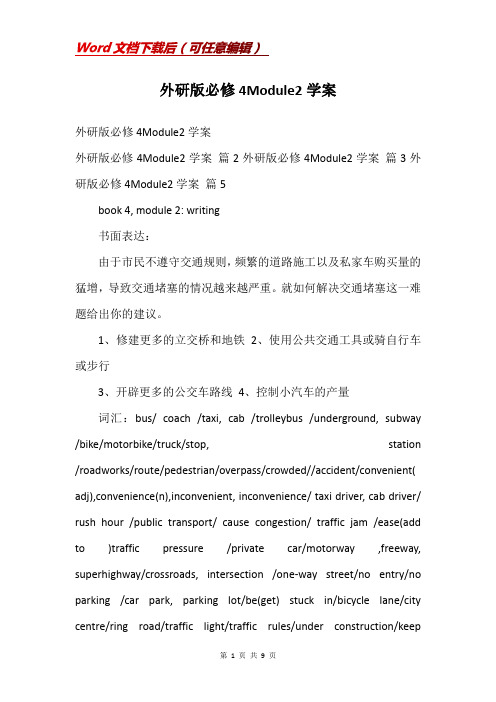
外研版必修4Module2学案外研版必修4Module2学案外研版必修4Module2学案篇2外研版必修4Module2学案篇3外研版必修4Module2学案篇5book 4, module 2: writing书面表达:由于市民不遵守交通规则,频繁的道路施工以及私家车购买量的猛增,导致交通堵塞的情况越来越严重。
就如何解决交通堵塞这一难题给出你的建议。
1、修建更多的立交桥和地铁2、使用公共交通工具或骑自行车或步行3、开辟更多的公交车路线4、控制小汽车的产量词汇:bus/ coach /taxi, cab /trolleybus /underground, subway /bike/motorbike/truck/stop, station /roadworks/route/pedestrian/overpass/crowded//accident/convenient( adj),convenience(n),inconvenient, inconvenience/ taxi driver, cab driver/ rush hour /public transport/ cause congestion/ traffic jam /ease(add to )traffic pressure /private car/motorway ,freeway, superhighway/crossroads, intersection /one-way street/no entry/no parking /car park, parking lot/be(get) stuck in/bicycle lane/city centre/ring road/traffic light/traffic rules/under construction/keepcool/…句型:1. what’s the problem with… ?2. what’s the solution to the problem?3. it’s time for sb to do sth./it’s high time that sb did sth.4. we should take measures/steps/action to do sth./measures should be taken to…5.the reason why… is that…6. it’s a good idea to…7.how about/what about…? 8.why not/why don’t we… ? 9.let’s do …10.we’d better (not) do…补充:第一:first/firstly/at first/first of all/in the first place/to begin with/to start with/for one thing…第二: second/secondly/in the second place/next/then/for another thing…第三: third/thirdly/besides/in addition/furthermore/moreover/what’s more…最后/总之: finally/at last/lastly/in the last place/last of all/last but not least/in a word/in a nutshell…参考范文the traffic jams have become a terrible problem and they are usually caused by people _______________________________________________________ (不遵守交通规则)and_____________(道路施工)on the streets. besides, the increase of new cars also_______________________________________(导致)the traffic jams . therefore, __________________________________________(交通堵塞越来越严重). this causes people’s inconvenience and it’s high time _________________________________(采取措施解决这一问题). what’s the solution to the problem? my suggestions are as follows: ____________(第一), we should build more__________(立交桥) and underground lines so as to ______________________(缓解交通压力). _______________(第二),we’d better go to work or go shopping by bus ,by bike or on foot instead of driving private cars. __________(第三), ______________________(好点子) to open up more public bus routes. __________(最后), the production of cars should ____________(控制), for there are too many cars moving on the roads every day.________(总之), i believe we can improve our traffic conditions if we try our best.book 4 module 2 p12getting around in beijingread the passage and answer:1.________________________________________________________(招手,立刻就有出租车)time:2.they are usually red, and they _________the price per kilometeron the window.3.you should check the cab has a business _________(permit/permission), and ______________you ask for a ___________(发票,收据).4.public transport ___________(offer/provide/supply)a cheap way to _____________in beijing.5.there are 20,000 buses and _____________(电车)in beijing, but they __________(must/should/can) get very ___________.6.____________________________________to avoid public transport during the rush hour.7.________(车费)are cheap, _____________(to start/starting/started) at 1 yuan.8.buses numbered 1 to 100 ________________(limit)travel within the city centre. higher numbers have destinations _______________________(郊区).9.tourists shouldn’t miss the 103bus _______ offers one of the most ____________(impress/impressive/impression) routs, _________ the forbidden city and the white pagoda in beihai park.10.you’ll ______________________(看见) the rapidly changing city.11.however, there is also a night bus service, provided by buses with a number in the 200s.12.there _____(is/are) four _____________ lines in beijing, andseveral lines are _________________________. trains are fast and ________________(方便的), but rush hours _______ be terrible.13.tourists like these human-pedalled “tricycle taxis”, but they ________ be expensive.14.you should talk to the driver ,and make sure you know the price before you begin the journey, for example, if it is per person, single, or return.(分析本句)15.tricycles are worth_____________(use/to use/using/being used/to be used), if you want to __________ (explore/exploration) the narrow alleys(hutong)of old beijing.book 4 module 2 p14speaker 1on my way home a few days ago, i _______ _________ again in the traffic. while i was waiting, i saw a group of taxi drivers in front of me getting out of their cars. they seemed to know each other. they had coffee cups and one of them carried a thermos flask and ________ _______ some hot water to make tea. it was quite funny! but even after the tea party was over, the traffic was still _________ and we still couldn’t move.speaker 2a few days ago i had to catch a plane to sichuan province. the plane took off at 5:30 pm so i set off at ______ pm to allow plenty of time toget to the airport. but it wasn’t enough time. at 5 pm i was still only at the third _______ ________. it was just ridiculous! there was____ ____ i was going to catch the plane, so i told the taxi driver to turn back and go home.speaker 3it’s only 7 kilometers from my home to my place of work. but every day, it is almost certain there will be a traffic ______ as i get near the west fourth ring road. it’s so annoying! it takes at least 15 to 20 minutes to _______ ___________ it. i think the traffic jams are usually caused by people disobeying traffic rules. to get to the front of the line, they often take the bicycle _______. it’s the same with pedestrians and cyclists. they don’t wait for the green light to pass.speaker 4beijing traffic seems to have got noticeably worse recently. the causes seem to be __________ as the city prepares for the olympics, and a huge increase in new car owners and new drivers. whatever the cause, it’s enough to __________ you mad! why not limit the number of cars, build more _______________ lines or follow shanghai and build roads in the sky? these days i only go out in my car at night after 9 pm. that way i avoid the worst of the traffic.speaker 5going to the summer palace the other evening there was a bigtraffic jam at a narrow bridge. one lane in either direction. so obviously there were lots of cars _____________ on the wrong side of the road which then came to a complete stop when a car came ____ the other direction. result :no one was able to move for 10 minutes! as soon as it _____________ the same thing happened again. it’s unbelievable!book 4 module 2 p77conversation 1a: hello.nora: hi. it’s me , nora.a: hello. have you got your ticket?n: yes. i am coming on the ____th of june. the plane arrives at 5 pm. then i have a __________ at 6:15.a: that’s _________ hour. the roads will be very busy.n: how can i get to the central bus station?a: take the number 23bus at the airport. it will be just as quick as a taxi.n: thanks. i’ll let you know how i _________ ________.conversation 2a: hello.n: hi. it’s me. nora. there’s no way i’ll get to the bus ____________ in time for my coach. i’m on the 23 bus and it’s stuck in a traffic jam. it’s just ridiculous!a: oh dear. where are you exactly?n: on the ring road, not far from the hospital.a: keep _________! i’ve got an idea. why not take the underground? there’s a station near the hospital. it’ ll be _____________ but much quicker than the bus.n: good idea. i’ll phone you later.conversation 3a: hello.n: hi. it’s me again.a: hi, nora. where are you now?n: i’m at the bus station but i’ve __________ the coach. it’s so annoying! i only missed it by 2 minutes.a: listen! the coach stops at the railway station. take a taxi there now and you may catch the coach.n: ok. it’s worth ____________. i’ll speak to you later.conversation 4a: hello.n: it’s me again.a: where are you this time?n: on the coach! i finally ___________ ________ .a: it’s unbelievable!n: how do i get to your apartment from the coach station?a: ________ in the bus station ________ i’ll come and get you. what time do you arrive?n: at 8 o’ clock.a: see you then.n: thanks.。
外研版高一英语必修4学案Module4全单元学案2含有讲解

外研版⾼⼀英语必修4学案Module4全单元学案2含有讲解⾼⼀英语必修4学案Module 4 Grammar主备⼈: 周次18 时间_____编号:NO. 89 姓名:_____审核⼈:_________Learning Contents(学习内容): GrammarLearning Aims(学习⽬标):1. Make students learn how to use passive voice in different tenses.2.. To improve students’ oral practice of famous scientistsImportant and Difficult Points (重点难点):1. Use passive voice in different tenses.2. Remember the examples and the rules.【导读】被动语态1)被动语态的构成:被动语态是由“助动词be +done ”构成,⽽时态是通过助动词be, have, shall, will, should, would 的不同形式表现出来。
get doneget 是连系动词, 相当于be, 但get done 着重强调结果,并且get done句式不⽤by 来表⽰动作执⾏者,⽽be done 既可⽤by 表⽰出动作的执⾏者,也可以省略掉。
e.g. Our house is getting painted. We get paid by the day.含有情态动词的被动句式: 情态动词+be 或have been donee.g. The work must be done right now.be going to, be to, have to, used to等句式中的不定式后仍可以使⽤被动句式, 其中包括不定式完成式的被动句式. The task seems to have been finished.【导思】2)主语+谓语+宾语 e.g. He wrote this book. →The book was written by him.主语+谓语+双宾语(直接宾语与间接宾语)主语+谓语+宾语+宾语补⾜语e.g. They are going to paint the wall white.→__________________________________.The shop owner made him work over eight hours a day.He persuaded his father to give up smoking.____________________________________主语+谓语+it+宾补(形容词/名词)+to do/doing/that从句e.g. We consider it a waste of time to do so. →It is considered a waste of time to do so.3)vi. + prep. / vt.+n.+prep. / vi.+adv.+prep.这类短语变成被动语态时,介词不可省e.g. The house was broken into.Women were looked down upon in the old days.4)英语中主动形式表被动含义的⼏种情况当主语表⽰其本⾝具有某种特质或与众不同的特点,主语通常情况下是物⽽不是⼈。
2018届外研版必修4Module 3单元学案 (11页)

2018届外研版必修4Module 3单元学案重点识记单词1.bow vi.鞠躬2.bend vt.弯下腰3.hug vt.拥抱;紧抱4.aggressive adj.攻击的;挑斗的;挑衅的5.gesture n.姿势;姿态6.involve vt.包括;牵扯;卷入;与……有关7.slightly adv.轻微地;稍微8.youth n.年轻人9.spread vi.张开;蔓延;扩散;传播10.stare vi.凝视;盯着看11.wipe vt.擦;揩;抹12.panic v.& n.恐慌;惊慌13.request n.请求;要求14.favour n.恩惠;善意的行为15.live adj.现场的;活着的;有生气的16.slap vt.掌击17.religion n.宗教→religious adj.宗教的18.rude adj.粗鲁的;无礼的→rudeness n.粗鲁;无礼19.invitation n.邀请;请柬→invite vt.邀请20.classical adj.古典的;古代的→classic adj.经典的21.judgement n.判断;意见→judge v.判断;n.裁判;法官22.social adj.社会的→society n.社会23.equality n.平等→equal adj.平等的;vt.等于;比得上24.infectious adj.有感染性的→infect v.传染;感染→infection n.传染;感染municate vi.(用语言、信号)传递信息;交流→communication n.交流;沟通26.unconscious adj.无意的;不知不觉的→conscious adj.(反义词)有意的;有意识的;自觉的27.vary vi.变化→various adj.各种各样的→variety n.种类28.formal adj.正式的→formally adv.正式地→informal adj.(反义词)非正式的29.traditionally adv.传统地→traditional adj.传统的→tradition n.传统30.threatening adj.恐吓的;具有威胁的→threaten v.威胁→threat n.威胁31.deal n.协议;交易;vi.处理;应付;对待(过去式、过去分词dealt)32.performance n.表演→perform v.表演;运行;表现→performer n.表演者重点识记短语1.on guard(保持)警惕2.make a deal达成协议;做成交易3.lift up举起4.give away暴露(自己的情况)5.by accident偶然地6.up and down一上一下地7.say hello to向……问好8.switch on打开(灯、无线电等)9.hold up举起;延迟;阻碍必背经典句式1.When in Rome,Do as the Romans Do入乡随俗2.In France you should shake hands every time you say hello and goodbye.在法国,每当你打招呼或告别时都应该(和别人)握手。
外研版必修4Module2学案

外研版必修4Module2学案一、Module2 整体概述外研版必修 4 的 Module2 主要围绕“交通”这一主题展开,涉及了各种交通方式、交通问题以及未来交通的发展等方面的内容。
通过本模块的学习,学生能够了解不同交通方式的特点和优缺点,探讨交通拥堵等现实问题,并对未来交通的创新和变革进行思考。
二、重点词汇与短语1、“be connected with”:与……有联系;与……有关例如:His job is connected with the environment (他的工作与环境有关。
)2、“be/get stuck in”:被困在……例句:I was stuck in traffic for an hour (我被困在交通堵塞中一个小时。
)3、“in no time”:马上;立即比如:He finished his homework in no time (他很快就完成了作业。
)4、“get around”:四处走动;(消息等)传开“People can get around easily by bike in this small town”(在这个小镇上人们骑自行车可以很容易地四处走动。
)三、重点语法1、将来进行时将来进行时表示将来某一时刻或某一段时间正在进行的动作。
其构成是“will be +现在分词”。
例如:This time next week I will be lying on the beach (下周这个时候我将躺在海滩上。
)2、过去分词作定语过去分词作定语时,通常置于被修饰的名词之前或之后,表示被动和完成的意义。
如:The damaged car was sent to the garage (那辆损坏的汽车被送到了修理厂。
)四、课文解读1、“Traffic Jam”这篇课文介绍了城市交通拥堵的现状和原因,如车辆数量的增加、道路规划不合理等。
同时,也提到了一些解决交通拥堵的措施,如发展公共交通、限制私家车出行等。
外研高二英语必修四m3学案
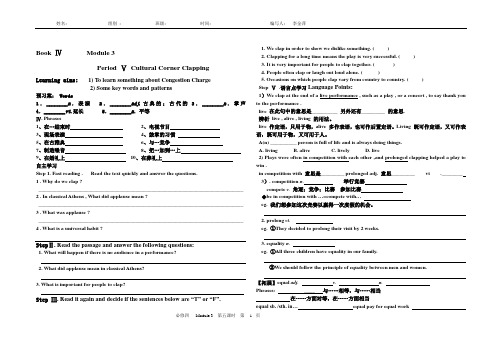
Book ⅣModule 3Period ⅤCultural Corner ClappingLearning aims: 1) To learn something about Congestion Charge2) Some key words and patterns预习案: Words1.________n.表演2.________adj.古典的;古代的3.________n.掌声4.________vt.延长 5.________n.平等Ⅳ. Phrases1、在…结束时2、电视节目3、现场表演4、鼓掌的习惯5、在古雅典6、与…竞争7、制造噪音8、把…加到…上9、在婚礼上10、在葬礼上自主学习Step 1. Fast reading . Read the text quickly and answer the questions.1 . Why do we clap ?______________________________________________________________________________ 2 . In classical Athens , What did applause mean ?______________________________________________________________________________ 3 . What was applause ?______________________________________________________________________________ 4 . What is a universal habit ?StepⅡ. Read the passage and answer the following questions:1. What will happen if there is no audience in a performance?2. What did applause mean in classical Athens?3. What is important for people to clap?Step Ⅲ. Read it again and decide if the sentences below are “T” or “F”.1. We clap in order to show we dislike something. ( )2. Clapping for a long time means the play is very successful. ( )3. It is very important for people to clap together. ( )4. People often clap or laugh out loud alone. ( )5. Occasions on which people clap vary from country to country. ( )StepⅤ.语言点学习Language Points:1)We clap at the end of a live performance , such as a play , or a concert , to say thank you to the performance .live 在此句中的意思是__________ 另外还有_________ 的意思.辨析live , alive , living 的用法。
高中英语 Book IV Module 4 2学案 外研版必修4
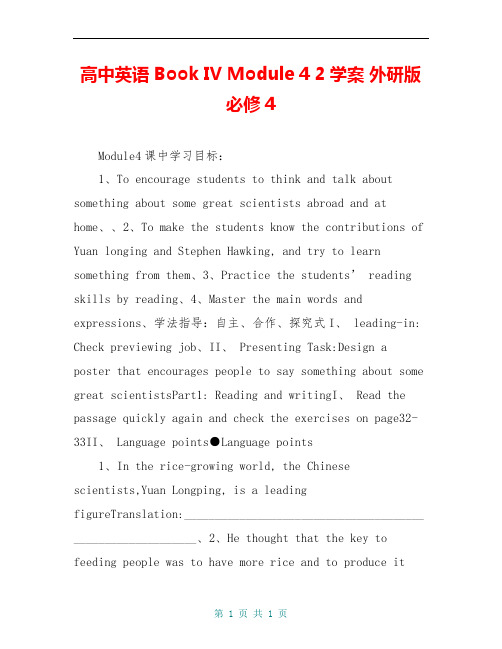
高中英语 Book IV Module 4 2学案外研版必修4Module4课中学习目标:1、To encourage students to think and talk about something about some great scientists abroad and at home、、2、To make the students know the contributions of Yuan longing and Stephen Hawking, and try to learn something from them、3、Practice the students’ reading skills by reading、4、Master the main words and expressions、学法指导:自主、合作、探究式I、 leading-in: Check previewing job、II、 Presenting Task:Design a poster that encourages people to say something about some great scientistsPart1: Reading and writingI、 Read the passage quickly again and check the exercises on page32-33II、Language points●Language points1、In the rice-growing world, the Chinesescientists,Yuan Longping, is a leadingfigureTranslation:_______________________________________ ____________________、2、He thought that the key to feeding people was to have more rice and to produce itmore quickly、Translate:_______________________________________________ _____________、总结:介词to+n/v-ing 问题的答案_______________门的钥匙______________解决问题的关键________________大楼的入口_____________________3、 First Yuan Longping experimented with different types of rice、Translate:_______________________________________________ _____________观察with 的意思:My hands were blue with cold、___________________He writes with a pen、____________________________You must handle this parcel with care、_______________________experiment on / with sth表示“对……进行实验”。
高一英语外研版必修4教案:Module2 Period3 含解析 精
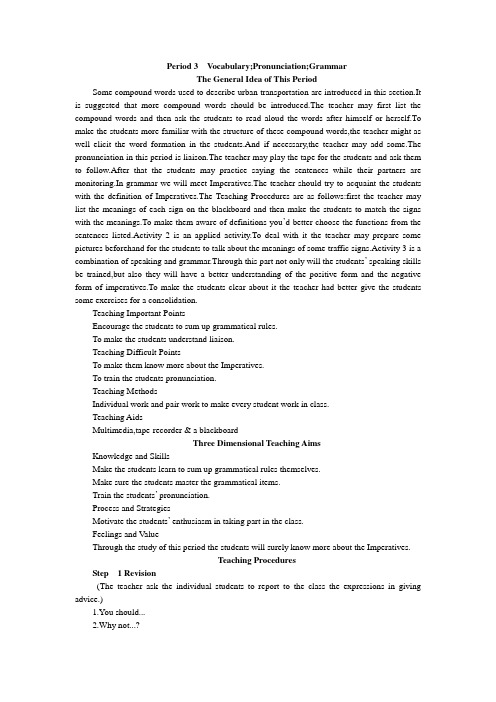
Period 3Vocabulary;Pronunciation;GrammarThe General Idea of This PeriodSome compound words used to describe urban transportation are introduced in this section.It is suggested that more compound words should be introduced.The teacher may first list the compound words and then ask the students to read aloud the words after himself or herself.To make the students more familiar with the structure of these compound words,the teacher might as well elicit the word formation in the students.And if necessary,the teacher may add some.The pronunciation in this period is liaison.The teacher may play the tape for the students and ask them to follow.After that the students may practice saying the sentences while their partners are monitoring.In grammar we will meet Imperatives.The teacher should try to acquaint the students with the definition of Imperatives.The Teaching Procedures are as follows:first the teacher may list the meanings of each sign on the blackboard and then make the students to match the signs with the meanings.To make them aware of definitions you’d better choose the functions from the sentences listed.Activity 2 is an applied activity.To deal with it the teacher may prepare some pictures beforehand for the students to talk about the meanings of some traffic signs.Activity 3 is a combination of speaking and grammar.Through this part not only will the students’ speaking skills be trained,but also they will have a better understanding of the positive form and the negative form of imperatives.To make the students clear about it the teacher had better give the students some exercises for a consolidation.Teaching Important PointsEncourage the students to sum up grammatical rules.To make the students understand liaison.Teaching Difficult PointsTo make them know more about the Imperatives.To train the students pronunciation.Teaching MethodsIndividual work and pair work to make every student work in class.Teaching AidsMultimedia,tape-recorder & a blackboardThree Dimensional Teaching AimsKnowledge and SkillsMake the students learn to sum up grammatical rules themselves.Make sure the students master the grammatical items.Train the students’ pronunciation.Process and StrategiesMotivate the students’ enthusiasm in taking part in the class.Feelings and ValueThrough the study of this period the students will surely know more about the Imperatives.Teaching ProceduresStep 1 Revision(The teacher ask the individual students to report to the class the expressions in giving advice.)1.You should...2.Why not...?3.You’d better...4.It’s a good idea to...5.Make sure...Step 2 VocabularyT:Good job!Next step we will learn some compound nouns.Now look at the blackboard.What are they called?(Write the following two words on the blackboard.)traffic jam road workSs:They are compound nouns.T:You’re quite right.Now match the words from Box A with those from Box B to make compound nouns.(Show the following on the screen.)A bicycle city ring rush trafficB centre hour lane lights roadSuggested answers:1.bicycle lane2.city centre3.ring road4.rush hour5.traffic lightsT:More exercises are as follows:(Show the following sentences on the screen.)Match the words and definitionsExample:Lots of traffic which isn’t moving. traffic jam1.a road which goes around the city __________2.a read one means “stop”;a green one means “go”__________3.the busiest time of the day __________4.a part of the road reserved for bicycles __________5.work in progress on the road __________6.the centre of the city __________(Give the students a few minutes and then call back their answers.)Suggested answers:1.ring road2.traffic lights3.rush hour4.bicycle lane5.road works6.city centreStep 3 PronunciationT:So much for the vocabulary.Now let’s come to the next part—pronunciation.(The teacher play the tape for the students.)Now listen to the underlined sounds in the following sentences.(Show the following sentence on the screen.)1.I got stuck again in the traffic.2.They seemed to know each other.3. ...and we still couldn’t move.4.It was just ridiculous.5.They don’t wait for the green light to pass.T:You must remember:Good pronunciation needs a lot of training,imitation and practice.Listening is as important as imitation.You should not only listen to the teacher’s and your classmates’ pronunciation,but also to tapes record your own reading after doing some repetition and imitation,and see how they are different and where you are wrong.Go on practicing until youget it.T:Now say these sentences aloud.Make sure you pronounce the underlined sounds correctly.(Show the following on the screen.)1.They seemed to know each other.2. ...and we still couldn’t move.3.It was just ridiculous.4.They don’t wait for the green light to pass.5.Why not build more underground lines?6....which then came to a complete stop.(The teacher divide the students into a few groups and then make them practice the sentences individually.)Step 4 GrammarT:Just now we practiced our pronunciation.The rest of the time let’s learn some grammar:Imperatives.Look at the signs and complete the meanings of the other three signs.Suggested answers:3.Don’t turn left.(no left turn.)4.Don’t stop (no parking).5.Don’t walk (no pedestrians).T:Do you know what they have in common?You may decide what they do from the following list of 4 possibilities.(Show the following list on the screen.)1.They give advice.2.They give instructions.3.They give information.4.They give permission.Suggested answers:2T:Good job!As we all know,traffic jams are usually very annoying.Look at the picture.What is the man doing?S:From the picture we can guess maybe he is worried about the road condition.He is very angry.T:You’ve got it!Now read the following dos and don’ts for motorists stuck in a traffic jam.Tick the ones you agree with.Dos:1.Switch off the motor.2.Turn on the car radio.3.Speak to your passengers.4.Follow the rules of the road.5.Keep cool.Don’ts1.Leave the motor on.2.Blow your horn.3.React when others drive badly.4.Break the rules of the road.5.Get angry.(The teacher may ask the students to have a discussion and then make some representatives to report to the class.)Step 4 Summary and homeworkT:Today we have learned some compound words as well as the expressions in giving advice.Besides,we have practiced block+release.After class please practice more and finish Exercises 2 & 3.So much for today.Good-bye,everyone!Ss:Good-bye,sir!The Design of the Writing on the BlackboardModule 2Traffic JamThe third periodtraffic jam road worksRecord after Teaching_____________________________________________________________________________________________________________________________________________________________________________________________Activities and Research1.Try to choose a paragraph to practice your pronunciation.2.Find more compound nouns to analyse.Reference for TeachingGrammar由一道高考题谈祈使句2003年高考英语第24小题:—Sorry,Joe,I didn’t mean to...—Don’t call me “Joe”.I’m Mr.Parker to you,and __________you forget it.A.doB.didn’tC.didD.don’t说明:本题正确答案是D,题干中don’t you forget it是一个祈使句。
高中英语外研版必修4学案学案2:Module4 整单元 (外研版必修4)

Book ⅣModule 4 Great ScientistsPeriod ⅠReading &prehensionMayⅠ. Match the names in Column A with the inventions or discoveries in column B.1. Qian Xuesen a. father of integral calculus(积分学)2. Marie Curie b. Theory of Relativity3. Archimedes c. father of China’s aerospace4. Albert Einstein d. Radium and PoloniumⅡ. Translate the following into Chinese:1. biochemistry2. biology3. botany4. genetics5. zoology6. chemistry7. chemist 8. physicistⅢ. Read the passage fast, then choose the best answer for each of the following.1. How to produce more rice and more quickly?A. By enlarging growing areaB. By crossing different species of rice plantC. By planting rice several times a yearD. By adding more fertilizer2. The features of the special type of rice plant are .A. female and sterileB. male and born with seedsC. male and sterileD. female and born without seeds3. The greatest contribution Yuan Longping made is that .A. he discovered a rice plant with a higher yieldB. more rice fields were converted to growing vegetables and other cash cropsC. his discovery has been exported to other countriesD. more fields are used to grow rice4. Which of the following is True?A. Yuan Longping didn’t study hard at school.B. European countries don’t grow rice.C. Rice is the first most important crop in Pakistan.D. Yuan Longping once worked as a teacher.5. What’s the main idea of this passage?A. A brief introduction of Yuan Longping and his discovery.B. The importance of growing rice in a hungry food.C. How Yuan Longping experimented with different types of riceD. China is an agricultural country in great need of more riceⅣ. Do Part 2, 3 and 4 at pages 32-33Ⅴ. plete the following according to the information given1. As a boy,2. In college,3. As a young teacher,4. In 1966,5. In 1970,6. In the 1990’s,Ⅵ. Translate the third paragraph into Chinese.参考答案:Ⅰ1 c 2 d 3 a 4 bⅡ 1 生物化学 2 生物学 3 植物学 4 遗传学 5 动物学6 化学7 化学家 8物理学家Ⅲ B C A D ABook ⅣModule 4 Great ScientistsPeriod ⅡLanguage PointsMayⅠ. Language Points:1. invent, discover, find 与find out 的区别:(Introduction)invent —“发明”以前不曾有的事物discover—“发现”客观存在而不为人知的事物find—“找到,发现”,强调结果find out—“发现,查明,弄清楚”,强调过程联想:(发明n. ) 发明者(n. )(发现n.) 发现者(n.)found (vt.)—(p.f)—(p.p)()Ex. ①As we know, it was Thomas Edison who the electric light and Columbus thatAmerica.②My pen is missing. And I can’t it anywhere.③Have you why he was late today?④It’s known to all that the PRC in 1949.2. In the rice-growing world, the Chinese scientist, Yuan Longping, is a leading figure.①rice-growing (meaning), 结构为e.g. meat—eating animals讲英语的国家(联想:英语口语)热爱和平的②leading: adj.最重要的,主要的e.g. She was invited to play the leading role in the new film.(译)男主角女主角③figure n.数字;人影,体型;人物;画像,塑像v.描述,塑造;计算;估计;揣测e.g. The little boy is good at figures.She does exercise regularly to (保持体型) 短语:figure out 合计为,计算出;解决;理解,领会figure up 把……加起来e. g. Can you (解决)the problem in 5 minutes?3. …he began experiments in crop breeding.First Yuan Longping experimented with different types of rice.◆experiment n. 实验,试验v.做实验Ex. 用…做实验在…方面进行实验:给…做实验:进行实验,做实验:/ / / an experimente. g. 我们每周做两次物理实验。
高中英语外研版必修4学案学案2:Module3整单元(外研版必修4)
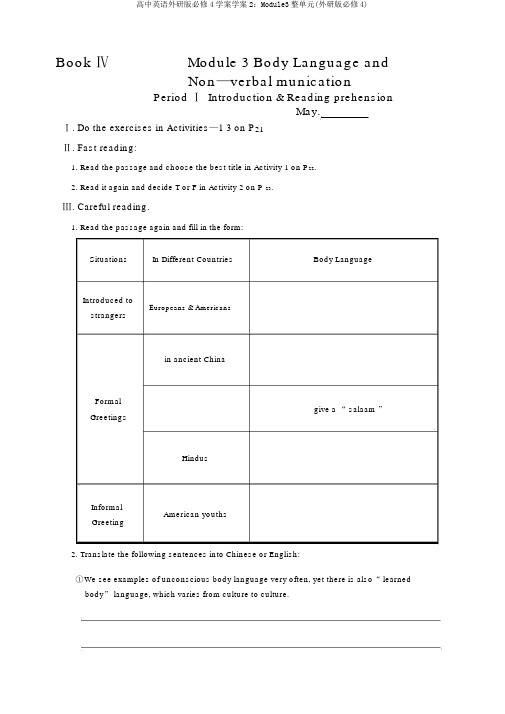
Book ⅣModule 3 Body Language andNon—verbal municationPeriod Ⅰ Introduction & Reading prehensionMay.Ⅰ. Do the exercises in Activities—1 3 on P21Ⅱ. Fast reading:1.Read the passage and choose the best title in Activity 1 on P22.2.Read it again and decide T or F in Activity 2 on P 23.Ⅲ. Careful reading.1.Read the passage again and fill in the form:Situations In Different Countries Body LanguageIntroduced toEuropeans & Americansstrangersin ancient ChinaFormalgive a “ salaam ”GreetingsHindusInformalAmerican youthsGreeting2.Translate the following sentences into Chinese or English:①We see examples of unconscious body language very often, yet there is also“ learnedbody” language, which varies from culture to culture.②即便今日,有些人在非正式地候,也仍旧用手来做一个相信的姿。
Ⅳ. Translate the words and expressions below:1. shake vt. & vi. ;震(past)(p.p.)2. point at point to point out3、与某人握手 4. wave one’ s hands5、某人指路 6. say goodbye to sb.7、在at a distance8、和某人沟通9、出⋯的原由10、保持警惕11、成交12、相互相信13、裸露14、手=15、能看破人心思的人16、入随俗1.shake hands;put the right hand over the left and bow slightly;Muslims;join their hands and bow their heads in respect;“Give me five.”2.(1)我们常常看到无心识肢体语言的例子,但是也有习得的体态语,这因国家的不一样而不一样。
高中英语外研版必修4学案学案2:Module2 整单元 (外研版必修4)
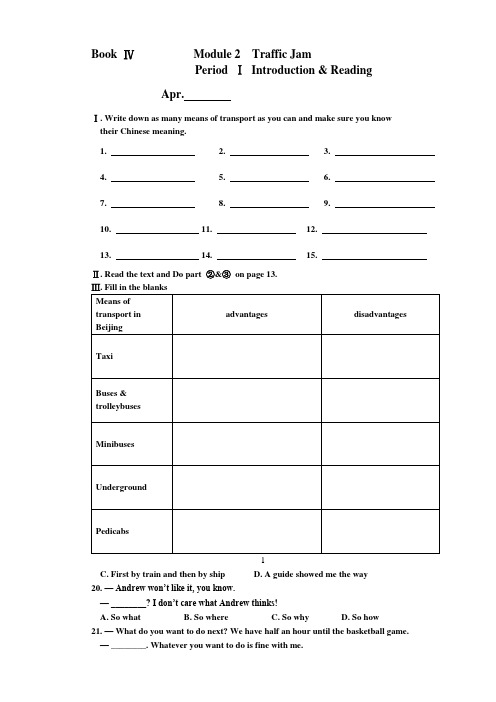
Book ⅣModule 2 Traffic JamPeriod ⅠIntroduction& ReadingApr.Ⅰ. Write down as many means of transport as you can and make sure you know their Chinese meaning.1. 2. 3.4. 5. 6.7. 8. 9.10. 11. 12.13. 14. 15.Ⅱ. Read the text and Do part ②&③on page 13.1C. First by train and then by shipD. A guide showed me the way20. —Andrew won’t like it, you know.—________? I don’t care what Andrew thinks!A. So whatB. So whereC. So whyD. So how21. — What do you want to do next? We have half an hour until the basketball game. — ________. Whatever you want to do is fine with me.A. It just dependsB. It’s up to youC. All rightD. Glad to hear that22. — What do you think of living in the country, David?— ________.A. Yes, perfectlyB. I agree with youC. Not reallyD. Well, that depends23. —You know who came yesterday?—Yao Ming? We had a basketball match.—_________ He came and watched the game.A. You guessed it!B. How did you know that?C. Well done!D. That was good news!24. —It’s been raining for a whole week. I think it’ll get fine soon.—_________. We are getting into the rainy season now.A. Yes, it willB. Of course notC. It’s possibleD. It’s hard to say25. —The boys are not doing a good job at all, are they?—__________.A. I guess not soB. I don’t guessC. I don’t guess soD. I guess not26. —Tom graduated from college at a very young age.—__________A. He is right.B. He must have been an excellent student.C. You are wonderful.D. Do you see it?27. —Do you think it’s going to rain over the weekend?—__________A. I don’t think.B. It looks so.C. I believe not.D. Are you sure?4Book ⅣModule 2 Traffic JamPeriod ⅡGetting Around in BeijingApr.1. get around =get round ,(1)The old couple used to这对老夫妇曾去世界各地旅行。
高中英语新课标外研版必修4教案Module3
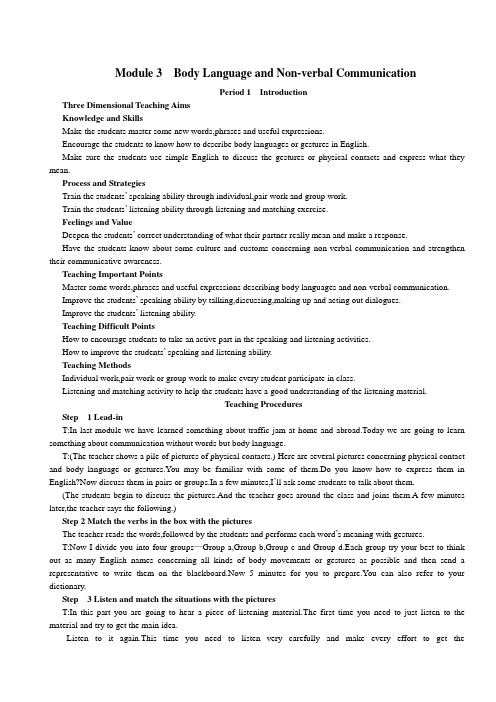
Module 3Body Language and Non-verbal CommunicationPeriod 1IntroductionThree Dimensional Teaching AimsKnowledge and SkillsMake the students master some new words,phrases and useful expressions.Encourage the students to know how to describe body languages or gestures in English.Make sure the students use simple English to discuss the gestures or physical contacts and express what they mean.Process and StrategiesTrain the students’ speaking ability through individual,pair work and group work.Train the students’ listening ability through listening and matching exercise.Feelings and ValueDeepen the students’ correct understanding of what their partner really mean and make a response.Have the students know about some culture and customs concerning non-verbal communication and strengthen their communicative awareness.Teaching Important PointsMaster some words,phrases and useful expressions describing body languages and non-verbal communication.Improve the students’ speaking ability by talking,discussing,making up and acting out dialogues.Improve the students’ listening ability.Teaching Difficult PointsHow to encourage students to take an active part in the speaking and listening activities.How to improve the students’ speaking and listening ability.Teaching MethodsIndividual work,pair work or group work to make every student participate in class.Listening and matching activity to help the students have a good understanding of the listening material.Teaching ProceduresStep 1 Lead-inT:In last module we have learned something about traffic jam at home and abroad.Today we are going to learn something about communication without words but body language.T:(The teacher shows a pile of pictures of physical contacts.) Here are several pictures concerning physical contact and body language or gestures.You may be familiar with some of them.Do you know how to express them in English?Now discuss them in pairs or groups.In a few minutes,I’ll ask some students to talk about them.(The students begin to discuss the pictures.And the teacher goes around the class and joins them.A few minutes later,the teacher says the following.)Step 2 Match the verbs in the box with the picturesThe teacher reads the words,followed by the students and performs each word’s meaning with gestures.T:Now I divide you into four groups—Group a,Group b,Group c and Group d.Each group try your best to think out as many English names concerning all kinds of body movements or gestures as possible and then send a representative to write them on the blackboard.Now 5 minutes for you to prepare.You can also refer to your dictionary.Step 3 Listen and match the situations with the picturesT:In this part you are going to hear a piece of listening material.The first time you need to just listen to the material and try to get the main idea.Listen to it again.This time you need to listen very carefully and make every effort to get thedetails.Meanwhile,match the situations with the picture above.Step 4 Say What You Do When You...T:Work in pairs.Act out the movements and say the relevant words and expressions according to the following situations given in this activity.Five minutes for you to prepare.Step 5 Read and answer the questionsT:In last activity some students performed a lot of situations.This activity is an open one,so different students have different opinions.Choose an answer for Exercise 1 and give reasons for your choice.Step 6 Summary and homeworkIn this class we’ve mainly learned something about body languages by speaking and listening,so we’ve got more information about body languages and our speaking and listening abilities have been improved.At the same time,we have learnt some words,such as point,shake,smile and some situations in which you use body language such as meet a friend,show someone the way,say no and so on.HomeworkRemember them and learn to use them.After class,try to collect more information about body language and prepare for next part—Reading and vocabulary.The Design of the Writing on the BlackboardModule 3Body Language and Non-verbal CommunicationThe first periodpoint,shake,smile,waveshow...the waycommunicate withshake handsRecord after Teaching______________________________________________________________________________________________________________________________________________________Period 2Reading and VocabularyThree Dimensional Teaching AimsKnowledge and SkillsTrain the students’ reading ability.Learn some useful words and expressions.Learn some facts about body language.Process and StrategiesMake the students know more about body language and communication customs as well as cultures in different countries and areas.Feelings and ValueMake the students have a better understanding of body language and non-verbal communication.Inspire their interest in different customs and cultures of different countries and areas.Encourage the students to learn and use such body language to communicate with each other through their action.Teaching Important PointsHelp the students to understand the passage better.Learn and master some important words and phrases in this period.How to let the students understand the body language in different countries and use them correctly.Teaching Difficult PointsHow to help the students improve their reading ability and understand the passage better.How to master the important Language Points in this passage.Teaching MethodsDiscussion to lead in the reading class.Fast reading to get the main idea of the text.Intensive reading to understand the passage better.Explanation to help the students master some Language Points.Teaching ProceduresStep 1 Greetings and revisionT:(Greet the whole class as usual.) Ask the students to act their dialogue out.Step 2 Discussion and lead in(Show the following words and phrases on the screen.)communication position unconscious aggressive gesture involve bow slapspread bend hug stare formal informal communicate with make a deal mind readerhold up vary from...to...be busy with give away on guardLet the students read the words and phrases after the teacher.The teacher can give a brief introduction to the students if necessary or they may discuss with their partners.The teacher shows the questions on the screen.1.Can you guess what someone is thinking or feeling by looking at their body language?2.Do people from different parts of the world use different body language?What about peoplewho live in different parts of China?3.How do you communicate the following with body language?Thank you!No.Yes.I don’t e here.Step 3 Fast readingRead the passage quickly and summarize the main idea of each paragraph.After a few minutes,the teacher checks the main ideas they summarize.Step 4 Intensive readingThis time you should read slowly and carefully.Show the following questions on the screen.1.Not all body language is conscious.2.Europeans shake hands with their left hand.3.In Asia,people touch strangers when they meet.4.In the US a “high five” is a way of saying hello.5.A “high five” is a formal gesture.6.Body language is less communicative than spoken or written language.Suggested answers:1.T2.F3.F4.T5.F6.FStep 5 Language studyEx.1 Complete the sentences with the words given.(The teacher shows the words and exercise on the screen.)Aggressive deal gesture greet formalinformal position trust unconscious Weapon1.Guns and knives are two different types of__________.2.Someone who has a(n)__________attitude may be violent.3.You can __________someone by saying “Hello”.4.Your __________is the way you are sitting or standing.5.If you are __________of something you do not know it is happening.6.A(n) __________is a business agreement.7.A(n) __________is a movement of the body to communicate something.8.If you __________someone you believe them and rely on them.9.”Give me five!” is a(n) __________greeting.10.People are usually more __________with people they don’t know.1.weapons2.aggressive3.greet4.position5.unconscious6.deal7.gesture8.trustrmal10.formalEx.2 Translate the following sentences into Chinese.1.The weather varies from place to place.2.They were involved in the matter.3.The children stared at the coloured ballons.4.We made a deal and agreed to help him out.5.The girls are busy greeting the foreigners over there.Step 6 Listening and consolidationListen carefully.Pay attention to the pronunciation and intonation.Step 7 Summary and homeworkT:In this period we have learned some vocabulary and please try to keep them in mind after class.Through the reading of the text we know something about body language and non-verbal communication.We have learned that different people have different ways of making communication through body language.After class,please read this passage again and again till you can recite it or retell it in your own words;meanwhile,try your best to master the useful expressions in this period.What’s more,remember to preview Grammar 1;Listening and vocabulary.Though we are making much progress,we have a long way to go.So it is our task to study hard and make great efforts to spread our culture.So much for today.Good-bye,everyone!Activities and Research1.Find out more information about body language.2.Encourage the students to use the body language they have just learned.The Design of the Writing on the BlackboardModule 3Body Language and Non-verbal CommunicationThe second periodstare atmake a dealbe involved invary from...to...be busy doing sth.Record after Teaching_____________________________________________________________________________________________________________________________________________________________________________________________________________________Period 3Grammar 1;Listening and VocabularyThree Dimensional Teaching AimsKnowledge and SkillsMake the students learn to sum up grammatical rules themselves.Make sure the students master the grammatical items.Train the students’ listening ability and improve their listening skill.Process and StrategiesMotivate the students’ enthusiasm in taking part in the class.Feelings and ValueThrough the study of this period the students will surely know more about adverbial clause of condition and understand the importance of knowing about different customs and culture by listening.Teaching Important PointsEncourage the students to sum up grammatical rules.Further improve the students’listening skill.Teaching Difficult PointsTo make them be able to analyze the sentence structure of adverbial clause of condition and use what they learn in Grammar 1 to make up such kind of sentences.Teaching MethodsIndividual work and pair work to make every student work in class.Teaching ProceduresStep 1 Revision and lead-inThe teacher check the students’ homework of yesterday—reciting or retelling the reading passage.Step 2 Grammar 1Page 23.Look at the following sentences from the passage.Read them and pay attention to the conjunctions when and if.They are used to connect sentences or parts of sentences.Then finish the exercise below.Step 3 Listening and vocabularyT:Just now we have learned something about adverbial clause of condition.Follow me to do some listening.In Activity 1,you need to match the parts of the body with the words in the box.Look at the screen and follow me to read these words,meanwhile,try to catch their meanings.(The teacher shows the following words on the blackboard)ankle chest eyebrow finger forehead knee lips shoulder wrist(The teacher displays the following words on the blackboard.)bend bow clap hug kiss nod raise stare wipeT:Let’s put them into use through the following exercise.Complete the sentences with the words in the box above.1.You use your lips to __________someone.2.If you __________at someone you look at them for a long time.3.If you __________you hand you lift it up.4.You __________by moving your head up and down.5.When you bend your upper body forwards you__________.6.You have to __________your knees to sit down.7.If you’re hot you can __________the sweat from your forehead.8.At the end of a concert or a play it is usual to__________.(The teacher gives a few minutes for the students to prepare.)Step 4 Summary and homeworkT:Today we have learned adverbial clause of condition and two conjunctions when and if.After class,please do exercise 1 and exercise 2 on our workbook.The Design of the Writing on the BlackboardModule 3Body Language and Non-verbal CommunicationThe third periodfor the first timeshow sb.the waynod one’s headtake...offshake hands with sb.a bottle ofthank sb.for sth./doing sth.Record after Teaching______________________________________________________________________________________________________________________________________________________________________________________________________Period 4Function;Grammar 2;Pronunciation;Speaking Three Dimensional Teaching AimsKnowledge and SkillsTo let the students know the differences of an American accent and a British accent clearly and can use them freely in the future studies.To train their listening skills.To train their speaking skills.Process and StrategiesEncourage the students to speak in class through organizing some practice.Feelings and ValueThrough listening to and making comparisons between an American accent and a British accent,train the student’s cooperation concept and deepen their understanding of American English and British English.Teaching Important PointsTo motivate the students to work together.Teaching Difficult PointsHow to enable the students to master the differences between an American English accent and a British English accent.Teaching MethodsListening and discussion.Pair work as well as group work.Teaching ProceduresStep 1 Revision and lead-in(Omission)Step 2 FunctionLook through these sentences and underline the modal verbs.Then discuss with your partners to see in which situation people use them to give advice.(Show the following on the blackboard.)1.We use the modal verb __________to give advice.2.We use the modal verb __________to give strong advice.3.You __________means It’s a good idea to...4.You __________means It’s very important to...Step3Work in pairs and complete them with should,must and their negative forms by guessing.Part1.Here are three sentences with adverbial clause of condition.Read them through and answer the questions below.Practice:Step 4 SpeakingFirst please look at the instructions and ensure that you know what to do.T:Now I divide you into groups of four to prepare the same role play together.(Circulate and monitor their performances.)Step 6 Summary and homeworkHomework today is to practice the American accent after class.That’s all for today.You are dismissed!The Design of the Writing on the BlackboardModule 3Body Language and Non-verbal CommunicationThe fourth period1.It’s a good idea to do...2.It’s important to do...3.Every time sb.do...4.Your mind goes blank.5.by accident6.by chance7.make a toast8.take a sip9.refer toRecord after Teaching_________________________________________________________________________________________________________________________________________________________________________________Period 5Grammar 3;Writing;Everyday EnglishThree Dimensional Teaching AimsKnowledge and SkillsTo train the students’ speaking.To make the students learn to write a reply to an invitation.To make the students practice expressing themselves by using both everyday English and body language.Process and StrategiesMake the students learn how to use some simple Everyday English in a conversation.Through the analysis of the steps in writing a short reply to an invitation,the students may learn some strategies in writing comparisons.Feelings and ValueThrough the study of this period deepen their understanding of different customs and culture of different countries and areas.Teaching Important PointsLearn to write a reply to an invitation and compare a formal invitation and an informal one.Teaching Difficult PointsMake the students compare two kinds of invitations.Learn to use everyday English to communicate by combining body language.Teaching MethodsPair work and individual work.Discussion.Practice &explanation.Teaching ProceduresStep 1 RevisionCheck their workbook exercises.Have a dictation:communication,aggressive unconscious threatening involve deal spread give away hold up informal etc.Step 2 Grammar 3 Adverbial Clause of ConcessionRead the sentences and choose the correct meaning.You can discuss with your partner if you have difficulty in understanding them.(After a short discussion call back the students’ answers by asking one students to read the sentence and another to read the correct definition.Then show the answers on the blackboard)Discuss with your partner and fill in the blanks with whoever,whenever,wherever or however.Step 3 WritingRead the invitations and answer the questions on the book.Step 4 Everyday English1.Can I ask you a favour?A.Can I do something for you?B.Can you do something for me?2.How are you doing?A.How are you?B.What are you doing?3.What on earth can I talk about?A.There’s lots to talk about.B.I don’t know what to talk about.4.Have a great time!A.Enjoy yourself.B.Stay a long time.Step 5 Summary and homeworkHomework today is to make up a dialogue trying to use the useful expressions we have learned.This is the end of this class.You are dismissed.The Design of the Writing on the BlackboardModule 3Body Language and Non-verbal CommunicationThe fifth periodbe rude to sb.switch onrequestsocial occasionsRecord after Teaching_____________________________________________________________________________________________________________________________________________________________________________________________________________________Period 6Cultural Corner;Task;Module FileThree Dimensional Teaching AimsKnowledge and SkillsMake the students master some new words.Broaden their eyes with a passage about clapping.Instruct the students to learn to give advice for visitors to China.Process and StrategiesEncourage the students to consolidate what they have learned often.Feelings and ValueThrough the cultural corner the students may know the importance of understanding the differences in customs as well as culture of different countries and areas.Teaching Important PointsMake the students understand clapping deeply.Teaching Difficult PointsHow to give social advice for visitors to China.Teaching MethodsSkimming and explanationTeaching ProceduresStep 1 Revision(Greet the students as usual.)1.Check up their homework exercises.2.Ask a few students to act out their own dialogue.Step 2 Cultural cornerRead through this passage quickly to make sense of the word “clap”.Meanwhile,answer the questions:Why do people clap?When do people clap in China?What about in other countries?Step 3 TaskEvery group sends a representative to write all topics you think out.Step 4 Module fileThis part can be used for the students to check their understanding of this module by themselves,or theteacher may revise what we have taught and learnt with the help of this file.The Design of the Writing on the BlackboardModule 3Body Language and Non-verbal CommunicationThe sixth periodgiving giftsmeeting peopleeating a dinner conversation topicsgoing to somebody’s houseopening the gifttime you arrivetime you leavegreeting someone ...Record after Teaching_____________________________________________________________ _____________________________________________________________ _____________________________________________________________。
外研版必修四module 3 导学案
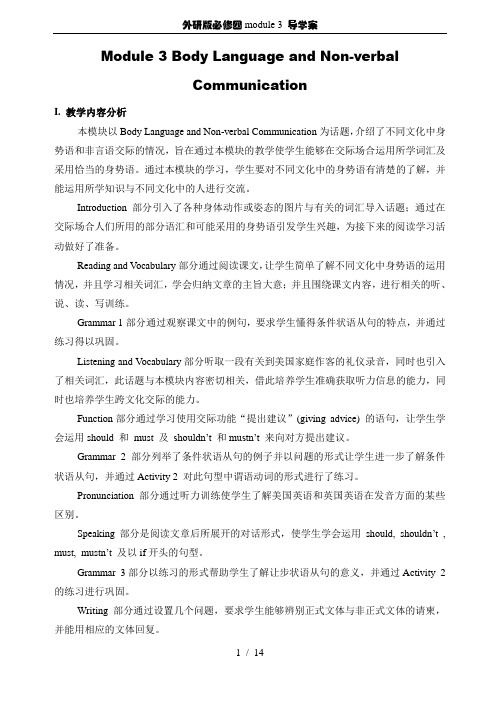
Module 3 Body Language and Non-verbalCommunicationI. 教学内容分析本模块以Body Language and Non-verbal Communication为话题,介绍了不同文化中身势语和非言语交际的情况,旨在通过本模块的教学使学生能够在交际场合运用所学词汇及采用恰当的身势语。
通过本模块的学习,学生要对不同文化中的身势语有清楚的了解,并能运用所学知识与不同文化中的人进行交流。
Introduction部分引入了各种身体动作或姿态的图片与有关的词汇导入话题;通过在交际场合人们所用的部分语汇和可能采用的身势语引发学生兴趣,为接下来的阅读学习活动做好了准备。
Reading and Vocabulary部分通过阅读课文,让学生简单了解不同文化中身势语的运用情况,并且学习相关词汇,学会归纳文章的主旨大意;并且围绕课文内容,进行相关的听、说、读、写训练。
Grammar 1部分通过观察课文中的例句,要求学生懂得条件状语从句的特点,并通过练习得以巩固。
Listening and Vocabulary部分听取一段有关到美国家庭作客的礼仪录音,同时也引入了相关词汇,此话题与本模块内容密切相关,借此培养学生准确获取听力信息的能力,同时也培养学生跨文化交际的能力。
Function部分通过学习使用交际功能“提出建议”(giving advice) 的语句,让学生学会运用should和must 及shouldn’t和mustn’t来向对方提出建议。
Grammar 2部分列举了条件状语从句的例子并以问题的形式让学生进一步了解条件状语从句,并通过Activity 2 对此句型中谓语动词的形式进行了练习。
Pronunciation部分通过听力训练使学生了解美国英语和英国英语在发音方面的某些区别。
Speaking部分是阅读文章后所展开的对话形式,使学生学会运用should,shouldn’t , must,mustn’t 及以if开头的句型。
外研版高中英语必修4 Module2 Period 3参考教案
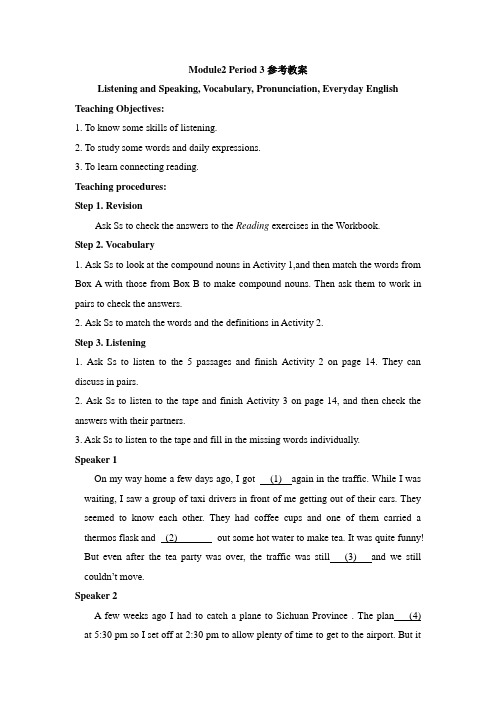
Module2 Period 3参考教案Listening and Speaking, Vocabulary, Pronunciation, Everyday English Teaching Objectives:1. To know some skills of listening.2. To study some words and daily expressions.3. To learn connecting reading.Teaching procedures:Step 1. RevisionAsk Ss to check the answers to the Reading exercises in the Workbook.Step 2. Vocabulary1. Ask Ss to look at the compound nouns in Activity 1,and then match the words from Box A with those from Box B to make compound nouns. Then ask them to work in pairs to check the answers.2. Ask Ss to match the words and the definitions in Activity 2.Step 3. Listening1. Ask Ss to listen to the 5 passages and finish Activity 2 on page 14. They can discuss in pairs.2. Ask Ss to listen to the tape and finish Activity 3 on page 14, and then check the answers with their partners.3. Ask Ss to listen to the tape and fill in the missing words individually.Speaker 1On my way home a few days ago, I got (1) again in the traffic. While I was waiting, I saw a group of taxi drivers in front of me getting out of their cars. They seemed to know each other. They had coffee cups and one of them carried a thermos flask and (2) out some hot water to make tea. It was quite funny! But even after the tea party was over, the traffic was still (3) and we still couldn’t move.Speaker 2A few weeks ago I had to catch a plane to Sichuan Province . The plan (4) at 5:30 pm so I set off at 2:30 pm to allow plenty of time to get to the airport. But itwasn’t enough t ime. At 5 pm I was still only at the third (5) road. It was just ridiculous! There was (6) I was going to catch the plane, so I told the taxi driver to turn back and go home.Speaker 3It’s only 7 kilometers from my home to my place of work. But every day, it is almost (7) there will be a traffic jam as I get near the west fourth ring road. It’s so annoying! It takes at least 15 to 20 minutes to(8) . I think the traffic jams are usually caused by people (9) traffic rules. To get to the front of the line, they often take the bicycle lane. It’s the same with pedestrians and cyclists. They don’t wait for the green light to pass.Speaker 4Beijing traffic seems to have got noticeably worse recently. The causes seem to be roadworks as the city prepares for the Olympics, and a huge (10) in new car owners and drivers. Whatever the cause, it’s enough to drive you mad! Why not (11) the number of cars, build more underground lines or follow Shanghai and build roads in the sky? These days I only go out in my car at night after 9 pm. That way I (12) the worst of the traffic.Speaker 4Going to the Summer Palace the other evening there was a big traffic jam at a narrow bridge. One lane in either (13) . So obviously there are lots of cars overtaking on the wrong side of the road which then came to a complete (14) when a car came in the other direction. Result: no one was about to move for 10 minutes! As soon as it (15) the same thing happened again. It’s unbelievable. Suggested Answers:(1) stuck (2) poured (3) jammed (4) took off (5) ring(6) no way (7) certain (8) get through (9) disobeying (10) increase(11) limit (12)avoid (13) direction (14) stop (15) cleared 4. Ask Ss to work in pairs and discuss the solutions to traffic problems.Step 4. Pronunciation &Everyday English1. Ask Ss to listen to the tape and pay attention to the underlined sounds in Activity 1。
外研版高三英语一轮复习学案必修四Module 2
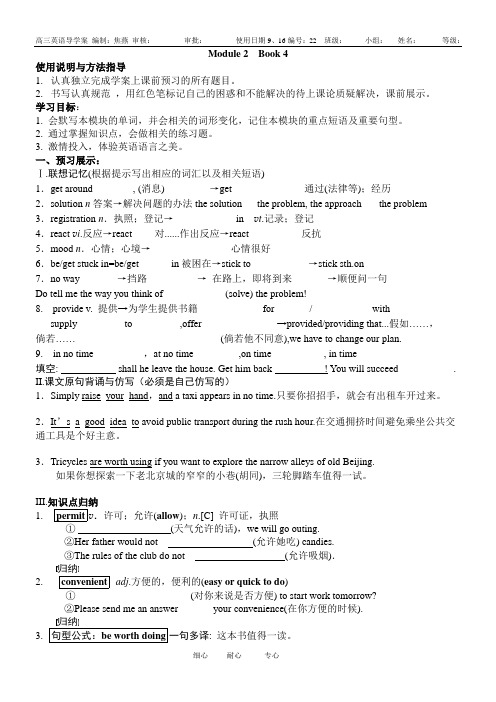
Module 2 Book 4使用说明与方法指导1.认真独立完成学案上课前预习的所有题目。
2.书写认真规范,用红色笔标记自己的困惑和不能解决的待上课论质疑解决,课前展示。
学习目标:1. 会默写本模块的单词,并会相关的词形变化,记住本模块的重点短语及重要句型。
2. 通过掌握知识点,会做相关的练习题。
3. 激情投入,体验英语语言之美。
一、预习展示:Ⅰ.联想记忆(根据提示写出相应的词汇以及相关短语)1.get around________, (消息)_________→get ______________通过(法律等);经历2.solution n答案→解决问题的办法the solution __ the problem, the approach___ the problem 3.registration n.执照;登记→____________ in v t.记录;登记4.react v i.反应→react ____对......作出反应→react __________反抗5.mood n.心情;心境→________________心情很好6.be/get stuck in=be/get______ in被困在→stick to ___________→stick sth.on____________7.no way _______→挡路__________→在路上,即将到来______ →顺便问一句____________ Do tell me the way you think of ____________(solve) the problem!8. provide v. 提供→为学生提供书籍_____________for_______/____________with___________supply_________ to _________,offer ______ ________→provided/providing that...假如……,倘若……_____________________________(倘若他不同意),we have to change our plan.9. in no time__________,at no time_________,on time__________ , in time___________填空: ___________ shall he leave the house. Get him back __________! You will succeed___________. II.课文原句背诵与仿写(必须是自己仿写的)1.Simply raise_your_hand,and a taxi appears in no time.只要你招招手,就会有出租车开过来。
外研版高中英语必修四学案Module2Traffic Jam3无答案外研必修4

Module 2 Traffic JamLearning paper 3 Extensive ReadingLearning aim: to practice learning skills and revise words and expressions in this moduleLearning methods: group work, discussing, etc.Activity 1: Read the passage on page 19 and try to answer the following questions.1. Which city is the USA’s most congested city?2. Why did the government in London decide to do something about the traffic jam?3. What is a congestion charge?4. Does the congestion charge work? How do we know?5. Do you agree with the idea of the congestion charge? Why?Activity 2: Read the passage on page 75 and try to answer the following questions.1.Why shouldn’t we carry heavy bags when we are traveling?2.If you want to sleep, what should you do with your suitcase?3.Why do many foreigners pay the taxi too much money?4.Why do travelers wear dark clothes?5.What attitudes should you have to the locals?6.When you cross the street, it’s a good idea to walk with other people, why?7.Why should you carry a spare bag?8.Which tips do you think are useful for you when you want to travel abroad? Why? Activity 3:阅读下面短文,并根据短文后的要求回答问题(请注意问题后的字数要求)。
新教材高中外研版英语选择性必修4学案Unit2SectionⅢDevelopingideasPres
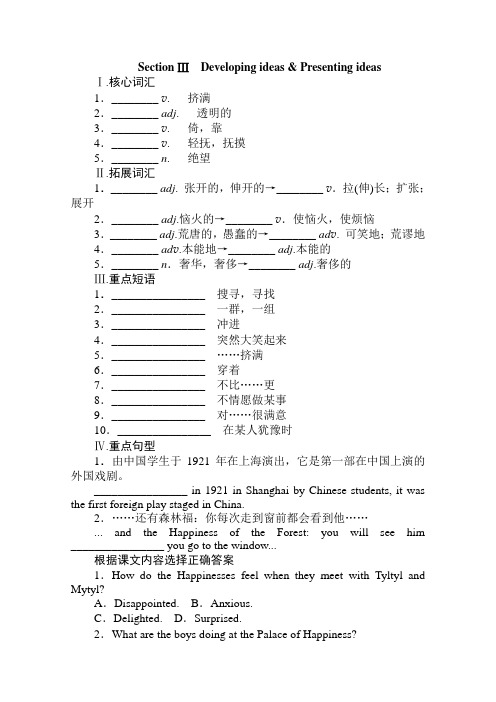
Section ⅢDeveloping ideas & Presenting ideas Ⅰ.核心词汇1.________ v. 挤满2.________ adj. 透明的3.________ v. 倚,靠4.________ v. 轻抚,抚摸5.________ n. 绝望Ⅱ.拓展词汇1.________ adj. 张开的,伸开的→________ v.拉(伸)长;扩张;展开2.________ adj.恼火的→________ v.使恼火,使烦恼3.________ adj.荒唐的,愚蠢的→________ ad v. 可笑地;荒谬地4.________ ad v.本能地→________ adj.本能的5.________ n.奢华,奢侈→________ adj.奢侈的Ⅲ.重点短语1.________________ 搜寻,寻找2.________________ 一群,一组3.________________ 冲进4.________________ 突然大笑起来5.________________ ……挤满6.________________ 穿着7.________________ 不比……更8.________________ 不情愿做某事9.________________ 对……很满意10.________________ 在某人犹豫时Ⅳ.重点句型1.由中国学生于1921年在上海演出,它是第一部在中国上演的外国戏剧。
________________ in 1921 in Shanghai by Chinese students, it was the first foreign play staged in China.2.……还有森林福:你每次走到窗前都会看到他……... and the Happiness of the Forest: you will see him ________________ you go to the window...根据课文内容选择正确答案1.How do the Happinesses feel when they meet with Tyltyl and Mytyl?A.Disappointed. B.Anxious.C.Delighted. D.Surprised.2.What are the boys doing at the Palace of Happiness?A.They are searching for the Happinesses.B.They are searching for the Blue Bird.C.They are playing with the Blue Bird.D.They are playing with the Happinesses.3.Which word can describe the boys according to the passage?A.Caring. B.Selfish.C.Stubborn. D.Naughty.4.Which of the following is right according to the whole passage?A.The two boys don't want to give the Blue Bird to the little girl.B.The Blue Bird will never be back again.C.The little girl doesn't want to give the bird something to eat.D.The Blue Bird they are searching for is in fact their own dove.►第一版块|重点词汇诠释1.burst out laughing突然大笑起来;不禁大笑burst v i. (burst-burst-burst)爆裂;爆发n. 突然破裂;爆发burst out laughing=burst into laughter 突然大笑起来burst out crying=burst into tears 突然大哭起来a burst of laughter/applause 突然的一阵笑声/掌声❶On hearing the shocking news that her son couldn't recover after the operation, the mother burst out crying.一听到儿子手术后仍无法恢复的噩耗,这位母亲就突然大哭起来。
高中英语外研版必修4学案学案2:Module1 整单元 (外研版必修4)

Book 4 Module 1 Life in the futurePeriod I Apr.I. Word studyconcret 替换的预测材料landfill catalogue娱乐,消遣开关surgeryoutpatient 乐观的首先II.Teaching steps1. Introduction: Exercise 1.2. on P12. Reading and vocabulary: Exercise3.4.5 on P3III. choose the best answer1. In the future, it is certain that .A. care for the environment will bee very unimportant.B. no smoking will be allowed within a future a future city’s limits.C. people will waste more natural resources.D. the cities are going to get bigger before they get smaller.2. Which of the following materials can not be recycled?A. plastic and aluminiumB. steel and glassC. paint and building rubbishD. wood and paper3. According to the text, the following statements are true except .A. it is very mon for ordinary citizens to travel in space in the future.B. smoking will be forbidden in the future.C. the future police will arrest criminals by firing nets.D. the future cars will not be powered by gasoline any more.4. In the text, “ free of charge” meansA. you have to pay much moneyB. sth cost littleC. sth needs spending much moneyD. you don’t have to pay money5. We will also have to rely more on alternative energy, such as solar and .A. wind powerB. steelC. coalD. All of above6. Everyone will be given a at birth that will never change no matter where they live.A. telephoneB. puterC. ID cardD. telephone numberIV. Fill in the blanksPart1: The city of the future1. the environment will bee very important.2. We will use lots of and waste fewer natural resources.3. We’ll have to rely on.Part2: The ideas of the university students.1. Garbage ships are used to pervert .2. Smoking will be possible only cities, and .3. Police will arrest criminals by .4. The will never change.5. The city will all forms of .6. All cars will be by and wind.7. Distance will bee mon.8. People with will be able to go anywhere in the world.9. by ordinary citizens will be mon.V.Read the text, choose Ture or False questions.1. In the future, police will arrest criminals by firing guns( )2. In the future, smoking will be possible only inside cities and indoors.( )3. All cars will be powered by electricity, solar energy or wind.( )4. Senior citizens and people with disabilities will be unable to go any where.( )5. Traveling in space by ordinary citizens will be mon.( )答案:Ⅰ.混凝土\alternative\ predict\material\ 垃圾填埋池\目录\ recreation \switch\ 外科手术\门诊病人\ optimistic\ for a startⅢ.DCBDA DⅣ.1.1)care for 2)recycled material 3)alternative energy2.1)landfill and environmental problems 2)outsi\outdoors 3)firing nets4)telephonenumber5)provide\recreation6)powered\electricity,solarenergy7)surgery8)disabilities9)Traveling in spaceⅤ.F F T F TBook 4 Module 1 Life in the futurePeriod II Language Points Apr.1. Where do you think it is?do you think 用于特殊疑问句作 ,其后使用 语序。
2020-2021学年英语外研版必修4学案:Module 2 Section Ⅲ Grammar

Section ⅢGrammar表一:祈使句表二:祈使句的结构【例1】Every day ________(read) a proverb aloud several times until you have it memorized.【解析】分析句子结构可知主句部分为祈使句,故用动词原形read。
句意:每天大声读几遍一条谚语;直到你把它记住。
【答案】read【例2】Close the door of fear behind you,and you________(see) the door of faith open before you.【解析】祈使句+and you will do为固定句型。
【答案】will see【例3】________(knock) at the door before you enter my room,please.【解析】考查祈使句,表示请求语气。
【答案】Knock【例4】Before you quit your job,______(consider) how your family would feel about your decision.【解析】考查祈使句,表示命令语气。
【答案】consider【例5】Find ways to praise your children often,________you'll find they will open their hearts to you.【解析】考查并列连词。
本题采用句式:祈使句+and(那么)/or(否则)+将来时。
句意:经常寻找途径来表扬你的孩子,那么你将发现他们会对你敞开心扉。
【答案】and【例6】Bring the flowers into a warm room______they'll soon open.【解析】考查并列连词。
“祈使句+and/or+表示结果的句子”是固定句型,祈使句相当于条件句;and表顺承,or表转折。
- 1、下载文档前请自行甄别文档内容的完整性,平台不提供额外的编辑、内容补充、找答案等附加服务。
- 2、"仅部分预览"的文档,不可在线预览部分如存在完整性等问题,可反馈申请退款(可完整预览的文档不适用该条件!)。
- 3、如文档侵犯您的权益,请联系客服反馈,我们会尽快为您处理(人工客服工作时间:9:00-18:30)。
Book ⅣModule 3 Body Language and verbal munication—NonPeriod ⅠIntroduction & Reading prehensionMay.Ⅰ. Do the exercises in Activities 1—3 on P 21Ⅱ. Fast reading:1. Read the passage and choose the best title in Activity 1 on P. 222. Read it again and decide T orF in Activity 2 on P. 23Ⅲ. Careful reading.2. Translate the following sentences into Chinese or English:①We see examples of unconscious body language very often, yet there is also “learned”body language, which varies from culture to culture.②即使今天,有些人在非正式地问候时,也仍然用手来做一个信任的姿势。
Ⅳ. Translate the words and expressions below:1. shake vt. & vi.摇动;震动(past) (p.p.)2. point at point to point out4. wave one's hands 3、与某人握手5、给某人指路 6. say goodbye to sb.7、在远处at a distance8、和某人交流9、给出…的理由10、保持警惕11、成交12、互相信任13、暴露14、举手=15、能看透别人心思的人16、入乡随俗1.shake hands;put the right hand over the left and bow slightly;Muslims;join their hands and bow their heads in respect;“Give me five.”2.(1)我们经常看到无意识肢体语言的例子,然而也有习得的体态语,这因国家的不同而不同。
(2)Even today, when some people have very informal styles of greeting, they still use their hands as a gesture of trust.IV1. shook; shaken2. 指着;指向;指出3. shake hands with sb.4. 挥手5. show sb. the way 5. 和某人告别7. in the distance; 隔一段距离8. municate with sb.9. give a reason for……10. on guard 11. make a deal12. trust each other 13. give away14. hold up one's hand; raise one's hand15. a mind reader16. When in Rome, do as the Romans do.Book ⅣModule 3 Body Language and verbal munication—NonPeriod ⅡLanguage PointsMay.1. I shake hands and say…●shake (past) (p.p) vt.vi.摇动,震动;动摇和某人握手●n. [C]摇动with a shake of one's head(1)他的话动摇了经理对他的信任。
(2)我和他握了握手,并向他问好。
(3)老师摇了摇头,拒绝了我的请求。
The teacher refused my request2. not at all 一点也不= not a littleeg. 这本书我一点儿也不喜欢。
—Are you cold?—/ (一点儿也不。
)I felt not a little tired after 2 hours' walk.◆at all “”可用于肯定句、否定句和疑问句(1)用于否定句,表示“一点儿也不”或“”(回答Thank you; It's very kind of you 等)(2)用于肯定句和疑问句,起强调作用,译为“”What did you do at all?(3)用于条件句,译为“既然;果真”Work hard if you do want to go to university at all.【拓展】after all in allfirst of all above allall the same all of a sudden3. Can you give reasons for your choice?give a reason for sth. /doing sth.eg. The monitor suddenly left without giving any reason.【拓展】reason for…for some reasonreasonable adj.adv.合理地;理智地4. When in Rome, do as the Romans do. 入乡随俗。
◆在when, while, once, before, till/until, whenever, if, unless, though 等引导的时间、条件、让步状语从句中,如从句S与主句S一致或S是it,经常可以省略“S+be”部分。
eg. (1)When ( )in Rome, do as the Romans do.(2)如果有必要的话,我会请你帮忙。
I will ask for your help .(3)虽然很累,但他继续走了下去。
5. vary from culture to culture◆vary vt. & vi.(大小,形状等)相异,不同;变化;改变在…方面不同随…而变化因…的不同而不同;从…到…不同eg.(1'The students work varies in quality. )(2)天气一天天变化。
(3)菜单(menu)随季节而变动。
【拓展】各种各样的;多变的;变化的adj.adj.各种各样的不同种类;多种式样n.种类繁多的,各种各样的(phrase)eg. many varieties of rosesThere is a variety of pictures to choose from. ①②他由于种种原因而辞职了。
your diet rather than eat the same food all the time. ▲You'd betterD. exchange C. improve A. varyB. change6. on guardeg. 那个士兵正在担任警戒。
on 表示“在活动;处于某种状态”◆值班出差eg. 度假故意地待售着火guard n.v.【拓展】be on guard against …go on guard be off guardput/set sb. on one's guard7. develop a formal way to do(反义词) formal adj.正规培训eg. 正规教育formal dress当我们达成协议时,我们握手。
8. We shake hands when we make a deal.做生意;对付分配;分给;vi.n. [C] 交易;待遇vt.◆deala great deal of ◆have a deal with…deal in sth.)来提问( deal with sth. /sb. 用) 来提问。
是及物动词,须接宾语,所以应用【近义短语】do with (注:doeg. 你是怎么对待英语学习的?=vt.9. involve ;sth.involve doing sth.sb. /sth. in…①准备工作将包括买一些纸和一把小刀。
eg.②你最好别拉我去做这样的事。
(作后置定语时) involved adj. (作前置定语时)涉及到的人eg. 复杂的经历与某人混在一起【拓展】被卷入…中专心致志做某事10. in respecteg. The prime minister is held in the greatest respect.。
类似的有:v. in+抽象n.”作状语,修饰谓语▲“沉默地吃惊地和平地舒适地◆respect n.①[U]show /have respect for…方面;细节②[C]in this respectin all /some /many respects【固】in respect of sth. =with respect to sth.eg. 这两个生意人在收入和性格方面是相似的。
11. spread vt.(past) (p.p) vi.n.eg. ①鸟儿张开翅膀。
②She spread the bread with butter.③这种疾病正在迅速蔓延。
④The bird's wings have a spread of nearly a metre.【拓展】spread oneselfspread like wildfire12. give away (vt.)eg. ①Bill Gates gave away much of his money to the charity.②她把国家和机密泄露给敌人。
13. Translate the following phrases:①想起②体态语,身势语③随文化的不同而不同④忙于做某事⑤低头致意⑦作为表示信任的姿势⑥举起,支撑;阻挡摇shake hands with sb shaken 1. shook ⑧一个常见问候方式一摇头(1)What he said shook the manager's trust in him.(2)l shook hands with him and said hollo to him.(3)with a shake of his hood2. not a bit 非常很十分l don't like this book at all.Not at all Not a bit走了两小时的路程之后,我感到非常累完全;根本;丝毫(1)不用谢;不客气(2)到底;真的;竟然你到底干了些什么?(3)既然你想要上大学,那么就努力学习吧。
